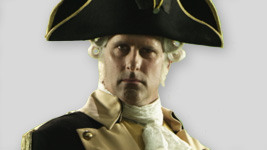KevlarNinja (talk | contribs) |
(→Trivia) |
||
| Line 19: | Line 19: | ||
==Simulated Battle== |
==Simulated Battle== |
||
==Trivia== |
==Trivia== |
||
| − | * [[Napoleon Bonaparte]], who |
+ | * [[Napoleon Bonaparte]], who was Washington's upcoming opponent, ordered ten days of mourning in France upon learning of Washington's death. |
* George Washington indirectly caused Napoleon's rise to power. When the French military assisted the American Revolution, their country quickly became bankrupt from the war, leading to the French Revolution. |
* George Washington indirectly caused Napoleon's rise to power. When the French military assisted the American Revolution, their country quickly became bankrupt from the war, leading to the French Revolution. |
||
| + | |||
[[Category:Warriors]] |
[[Category:Warriors]] |
||
[[Category:Modern Warriors]] |
[[Category:Modern Warriors]] |
||
Revision as of 03:19, 21 July 2011

"To be prepared for war is one of the most effectual ways of preserving peace."
-George Washington
George Washington, the American hero who, against all odds, defeated the mighty British Army;
vs. Napoleon Bonaparte, the bloodthirsty French Emperor whose maniacal dream was to conquer the world.
History
George Washington was born on February 22, 1732 in Colonial Virginia. Strong, brave, eager for combat, and a natural leader, he quickly became a senior officer during the early years of the French and Indian War. Years later, Washington's experience, military bearing, and leadership skills made him an obvious choice for Commander-in-Chief of the Continental Army during the American Revolution.
Washington forced the British out of Boston in 1776, but was defeated and nearly captured later that year when the British captured New York City. Early on Christmas morning in 1776, Washington's forces crossed the Delaware River and won two key battles at Trenton and Princeton, retaking New Jersey and restoring momentum to the Patriot cause. Negotiating with Congress, governors, and French allies, he held together a tenuous army and a fragile nation amid the threats of disintegration and invasion. Washington delivered the final blow in 1871, after a French naval victory allowed American and French forces to trap a British army at Yorktown, Virginia. With the surrender of British Lieutenant General Lord Cornwalis, the British goverment was finally prompted to negotiate an end to the conflict. After American indepenence was secured by the Treaty of Paris in 1783, Washington resigned rather than sieze power, and returned to his plantation at Mount Vernon, proving his opposition to dictatorship and his commitment to the emerging American political ideology of republicanism.
Washington presided over the Constitutional Convention that drafted the United States Constitution in 1787, and was unanimously elected the first President of the United States by the Electoral College in 1789. Aware that everything he did set a precedent for future Presidents to follow, Washington reluctantly accepted a salary (so that the office of President would not be limited only to the wealthy), chose the title "Mr. President" over more majestic names, and retired after his second term. In December 1799, Washington fell ill after spending several hours inspecting his farms on horseback in snow and freezing rain. He would die several days later on December 14, 1799.
Weapons
The Colichemarde Sword was the first of Washington's weapons to be reveled. In a recent sneak peek of the first act, it was also reveled to have the 6-pound cannon for long range.
Simulated Battle
Trivia
- Napoleon Bonaparte, who was Washington's upcoming opponent, ordered ten days of mourning in France upon learning of Washington's death.
- George Washington indirectly caused Napoleon's rise to power. When the French military assisted the American Revolution, their country quickly became bankrupt from the war, leading to the French Revolution.